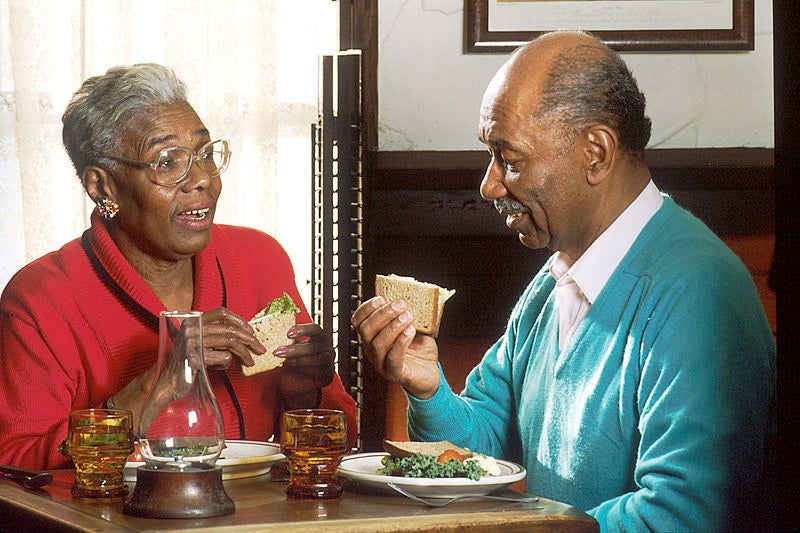This article was published in Scientific American’s former blog network and reflects the views of the author, not necessarily those of Scientific American
Can having a positive outlook on life actually make you physically healthier?
To answer this question, psychologists William Chopik, Eric Kim, and Jacqui Smith turned to the Health and Retirement Study (HRS), a nationally representative survey that has been gathering data from thousands of aged-50-and-older Americans since 1992. Namely, the researchers wanted to know if higher levels of optimism could protect seniors from the nasty mental and physical health effects of aging -- and if changes in optimism (over a relatively short period of time) actually resulted in positive changes in health.
At two separate timepoints spaced four years apart, the seniors' dispositional optimism was measured with questions like, "In uncertain times, I usually expect the best," or "If something can go wrong for me, it will" (someone with a high level of optimism would strongly agree with the first statement and strongly disagree with the second). The seniors also disclosed information about their current health status via self-report ("Would you say your health is excellent, very good, good, fair, or poor?") and via reported physician diagnoses for eight common chronic illnesses that become more prevalent in older age (high blood pressure, diabetes, cancer, lung disease, coronary heart disease, emotional/psychiatric problems, arthritis/rheumatism, and stroke).
On supporting science journalism
If you're enjoying this article, consider supporting our award-winning journalism by subscribing. By purchasing a subscription you are helping to ensure the future of impactful stories about the discoveries and ideas shaping our world today.
As people grow older, they become more optimistic...until they hit 68.
For 50-to-68-year-olds, average optimism levels keep rising higher and higher with age. However, that pattern changes somewhere around age 68, at which point the age-optimism curve swings back down and average optimism levels begin to fall as people get older.

Seeing the glass as "half-full" can keep you living a longer, healthier life.
Why does this happen? There are a bunch of plausible explanations, but one compelling possibility has to do with self-determination theory, which suggests that people derive their overall sense of well-being in life from fulfilling three core needs: Feeling competent (successful/capable), feeling autonomous (independent/self-governing), and feeling related (connected to others).
As people age through middle adulthood, they often start new jobs, switch jobs, receive promotions, make new friends, get married, have children -- all major life events that fulfill at least one of these three core needs. Unfortunately, however, as people cross into older older adulthood, all three of these core needs start to take massive hits instead of boosts. Friends and family members pass away, people retire and possibly move into assisted living facilities, and the normal mental and physical degradation that accompany aging make it very difficult for people to feel capable, strong, or self-sufficient in any capacity. Although self-determination theory technically deals with overall well-being, not optimism, it can still shed light on why optimism levels may start to fall when people hit 68 (which, by the way, just so happens to be the average age when most people say that they consider "old age" to officially start. This...is probably is not a coincidence).
Optimism is important. It leads to better health.
So, we know now that optimism increases with age until people hit 68 (which also happens to be the average "this is when I think Old Age starts" age), and then it drops off. But why does this matter?
Well, optimists are...generally quite a bit healthier than pessimists. Behaviorally, optimists are less likely to smoke, more physically active, and more likely to eat fruits, vegetables, and whole grains, even when controlling for a whole host of possibly-related third variables (including age, education, and pre-existing health). Optimists also have a lower risk of heart disease & stroke, require fewer sick days to recover from a stressful illness or injury, and show a stronger immune response to the flu vaccine.1

Optimistic older adults tend to be healthier -- partially due to better dietary choices.
Why is optimism so good for health? Again, there are many compelling possible explanations for this correlation...but one big potential reason is that optimism promotes the use of adaptive coping strategies when facing problems. Optimists, who (by definition) feel more confident that things in their lives will turn out well, will most likely see the value in (a) putting effort & time into strategizing a plan of action for addressing problems head-on, (b) asking others who have been in similar situations for advice, and (c) looking for opportunities to use hardships or obstacles as chances to learn something new and grow. Unlike pessimists, optimists are less likely to respond to hardships or obstacles by dwelling on negative emotions or using disengagement strategies to avoid dealing with problems (e.g., watching TV, daydreaming, or drinking/taking drugs).
If you think that everything (or most things) in your life work out well, there's no reason not to try using adaptive coping strategies to fix any problems or hardships you might encounter. In practice, this would mean that someone faced with the prospect of age-related deteriorating health, for example, would actively cope with this obstacle by exercising more, eating better, forging new social connections, and/or scheduling regular visits with a doctor to create a strategy for healthier aging. It's no surprise that people who actively pursue these proactive strategies will end up being healthier than their pessimistic counterparts, who are more likely to respond to the same concerns by, say, drinking more, watching more TV, shutting others out, feeling hopeless, or dwelling on their negative emotions about aging.
The good news is that you don't need to be born a natural optimist to reap the benefits of this research. Yes, optimism is somewhat heritable (about 25% of natural variance in optimism is due to genes), but the other 75% really comes down to people's social influences, personal experiences, and active choices to be more optimistic. If you haven't been an optimistic person thus far, it's not too late to become one and benefit; not only does optimism predict better health, but increases in optimism also predict improvements in health. When looking at the survey responses given during the two different timepoints four years apart, seniors who became more optimistic over time also reported significantly better health at the second measurement than at the first. Believe it or not, training yourself to become more optimistic in everyday life can end up having a great effect on your own physical and mental health.
THE TAKEAWAY
We all know that health deteriorates as we age. But some seniors stay healthier for far longer than others, and a higher trait level of optimism might be one of the sneaky reasons why. Optimistic people have a higher awareness of their own personal health risks, they maintain stronger social support networks, they exercise more, they smoke less, they eat healthier diets, they pursue their goals more effectively, and they cope with setbacks and obstacles more productively. Optimistic people, by their very definition, expect that good things will occur in their lives -- especially if they put in the necessary work and effort to make those things happen. It's certainly easy to see how this belief leads directly to optimists being far more likely than pessimists to cope with threatening information (e.g., an aging body and/or mind) by engaging in healthier adaptive strategies (e.g., figuring out a good diet & exercise plan to combat the undesirable effects of aging through preventive medicine).
To maintain physical and mental health throughout older adulthood, try focusing especially hard on life's positives. Go into situations with the expectation that everything will work out for the best, but arm yourself with some good active coping strategies in your arsenal just in case they don't -- especially after you turn 68 years young.
FOOTNOTE
1. Even though you can't establish causality based on correlational data, past research on optimism does suggest that it's likely the case that optimism exerts an effect on health, rather than the other way around (i.e., better health causing people to feel more optimistic). In a different study conducted several years ago, when participants were primed to feel optimistic, they subsequently reported feeling much lower intensities of pain after immersing their hands into freezing ice water (a cruel task known as the Cold Pressor Test). Optimism levels also typically remain stable before and after chronic illness survivors receive their diagnoses and their treatments. Again, if it were health that influenced optimism ratings, you would expect to see someone's optimism level taking a nose dive after a cancer diagnosis -- but it doesn't. You would also expect to see optimism go down with age in general, not just after 68 -- because no one really gets healthier as they age. But again, it doesn't.
IMAGE CREDITS
Glass: Pixabay, Public Domain. Photo by user "geralt."
Lunch Couple: Bill Branson National Cancer Institute/NIH, via Wikimedia Commons. Public Domain.
Japanese Women: Flickr. Photo by user "Mr Hicks46."
REFERENCE
Chopik, W.J., Kim, E.S., & Smith, J. (2015). Changes in optimism are associated with changes in health over time among older adults. Social Psychological and Personality Science, 6, 814-822.
